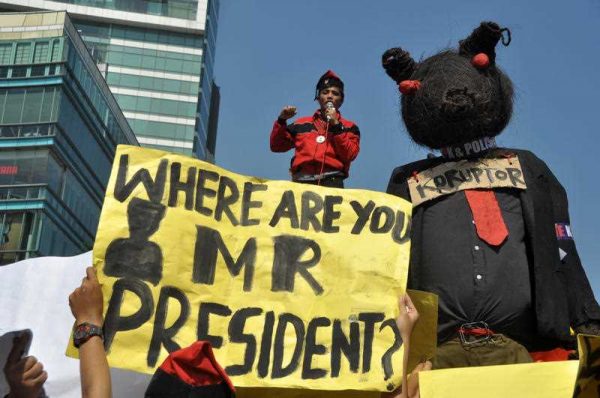the police (Polri) and the anti-corruption commission (KPK).
Tensions arose amongst criticism that Jokowi named Budi Gunawan as the only candidate for the vacant National Police Chief position. Four days later Gunawan was named by KPK as under suspicion for corruption. Jokowi took a heavy lambasting and eventually reversed his decision by cancelling Gunawan’s inauguration and nominating Deputy Police Chief Badrodin Haiti.
Given the controversy, the timing of Jokowi’s trip appeared to be rather fortuitous. Jokowi had already met all ASEAN leaders at both the annual 2014 ASEAN summit in Myanmar and the 2014 Asia-Pacific Economic Cooperation (APEC) meeting in Beijing. But officials in Jakarta justified the trip with the claim that it is an ASEAN ‘tradition’ for new leaders in the region to undertake their first overseas state tour to meet and greet fellow ASEAN leaders.
In an acknowledgement of the significance of the special relationship between Indonesia and Malaysia, Jokowi’s first stop was Malaysia. He met with Malaysia’s Prime Minister Najib Razak and discussed territorial disputes, the treatment of Indonesian migrant workers in Malaysia and trade and investment relations.
Tensions have erupted in recent months after Jokowi’s call to detain and destroy illegal fishing boats in Indonesian waters. But the border disputes began with the 2002 International Court of Justice’s ruling. This ruling stated that Malaysia owned two tiny islands in the Sulawesi Sea, Sipadan and Ligitan. But the question of maritime boundaries in the Sulawesi Sea, which is rich in oil and gas deposits, remained unanswered. As a result, the Ambalat Block maritime expanse, off the coast of Indonesian Kalimantan and Malaysian Sabah, has long been in dispute. State-to-state negotiations have been in deadlock for over a decade.
Malaysia’s poor treatment of Indonesia’s almost four million regular and irregular migrant workers has long encouraged rampant anti-Malaysia sentiments in Indonesia. Periodic moratoriums on the sending of domestic maids with the aim of improving dire living and working conditions have failed to eradicate tales of abuse and exploitation.
The leader-to-leader discussions were both productive and cordial but were overshadowed by the latest bilateral controversy. Just days before Jokowi’s visit a Malaysian advertisement was circulating on social media and attracted controversy for encouraging potential Malaysian buyers to fire their Indonesian maids. Calls emerged urging Indonesia to reconsider sending domestic workers to Malaysia and some felt that the Jokowi was obliged to raise the issue during his visit.
This is not the first time that second-tier issues have dominated Indonesia–Malaysia relations. Indeed, the steadily increasing bilateral trade and investment growth and deepening defence and security cooperation between the two countries are often systematically overshadowed by border disputes and the migrant worker issue.
These contestations have led to the general impression that the shared language, cultures and traditions of the Malays of Malaysia and their neighbouring Indonesian cousins holds little sway in the post-colonial context. Today nationalist narratives of political one-upmanship appear to be trumping the good-natured discourses of times past. This is a far cry from a relationship that was underpinned by familial concepts such as ‘nations of the one stock’ and ‘blood brotherhood’.
The conclusion of Jokowi’s trip to Malaysia was also not without domestic controversy. A memorandum of understanding (MOU) was signed to establish the production of an Indonesian national car. This decision resulted in another lambasting for Jokowi in the Indonesian media. Signing the MOU on behalf of Indonesia’s Adiperkasa Citra Lestari (ACL) was Abdullah Mahmud Hendropriyono, a former intelligence chief and retired general dogged by allegations of gross human rights abuses. Hendropriyono was also one of Jokowi’s key presidential backers and ACL is yet to be registered with the Indonesia Ministry of Industry. The Indonesian media accused Jokowi of handing a prime business deal to one of his key backers, a move that reminded some of the inside deals shared between Suharto and his cronies.
While Jokowi’s first overseas visit may have enhanced Indonesia’s status in the region, it did little to relieve domestic headaches and pacify his growing army of domestic detractors.
Dr Marshall Clark is a Senior Lecturer in the School of Politics and International Relations, Australian National University. Yasmi Adriansyah is a PhD candidate in the School of Politics and International Relations, Australian National University.


Joko Widodo needs to concentrate more on fixing his own government, its National Police(Polri) and Anti Corruption Commission(KPK). Your own government needs to be fixed before you rush to using the death penalty on people who have revealed some human decency. We want to see how you act and apply the laws of the country to these people.
The APEC summit was in Beijing, while it was the G20 summit that took place in Australia.
After returning from Malaysia, the trip that is the main subject of this post, Jokowi instructed the Manpower Ministry to work towards the repatriation of Indonesian migrant workers within a number of years. He claimed that their working overseas undermined Indonesia’s ‘pride and dignity’.
Perhaps Jokowi doesn’t know that migrant workers earn up to ten times as much money overseas as they would at home. But, when Indonesia’s pride and dignity are at stake, that calculation is no doubt irrelevant.